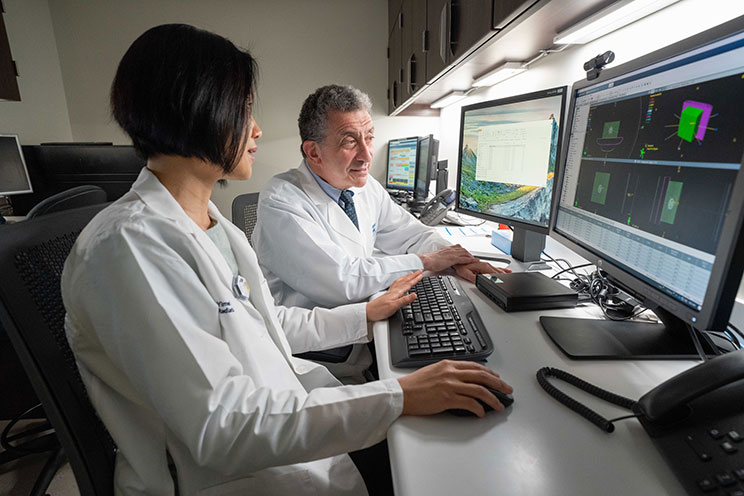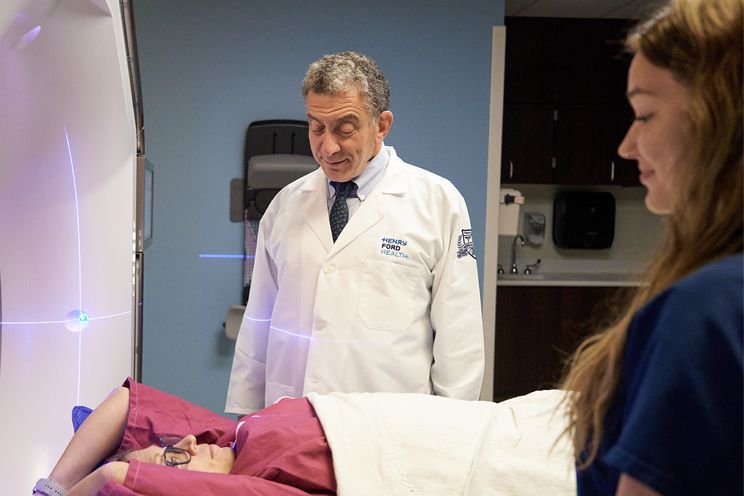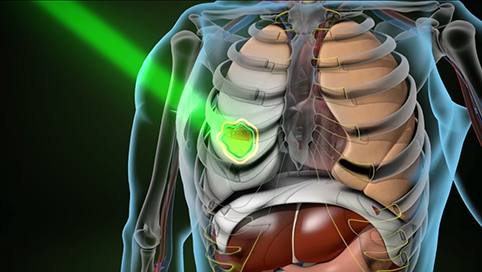Radiation Therapy
Our radiation therapy team has developed or improved many types of radiation therapy in order to offer the best approach to treat your cancer. Our team of experts are all experts in their field and are trained to offer the latest technology to our patients. Our team includes:
- radiation oncology physicians
- radiation physicists
- radiation biologists
- radiation therapists
- radiation safety experts
This team works together to design and deliver safe radiation therapies to treat your cancer.
Our facilities are accredited by the American College of Radiology, which evaluates safety, quality control, and patient care standards for practices that offer radiation oncology care.

Meet our Radiation Oncologists
The Henry Ford Difference
At Henry Ford Cancer, our team of experts offers the latest technology to better target and treat your cancer. Our radiation oncology program prides itself on offering:
- Expertise: The collective expertise of our radiation oncologists, physicists and other team members is recognized across the nation. As pioneers in the field, we are known for developing the most advanced cancer therapies, including radiosurgery, to treat more than 6,000 patients across the United States.
- Radiation oncologists and physicists travel from around the world to attend our radiosurgery education seminars
- Collaboration & Safety: Our specialists work together to continually improve patient care, the effectiveness of radiation treatment, and the safety of radiation technologies.
- Cutting-Edge Technology: We are always able to offer our patients the most-advanced radiation therapy treatments.
- We were the first organization in the world to develop radiosurgery to treat spinal cancer and noncancerous spinal tumors.
- Our radiation specialists have advanced the use of shaped beam radiosurgery and 3D conformal radiation therapy with intensity-modulated radiotherapy (IMRT) for primary and metastatic brain tumors.
- Patient Satisfaction: Outstanding access and attention to each patient’s unique physical and emotional needs has earned our team placement in the top 1% in the nation for patient satisfaction, as measured by Press Ganey.
- Research & Clinical Trials: Our radiation therapy team participates in bench to bedside research to improve radiation technologies and radiation delivery systems. These innovators help make sure you have access to the latest treatment options, close to home. Our researchers are funded by the National Cancer Institute, the Radiation Therapy Oncology Group, and other sources. Ongoing research by Henry Ford Radiation Oncology includes radiation physics technology applications, radiation therapy clinical trials for many types of cancer, including gene therapies for prostate cancer, as well as clinical trials focused on reducing the side effects of therapies for breast cancer.
- Supportive care: Our OncoStat clinic offers same-day care options for any urgent health needs, including treatment side effects.
How does radiation therapy work?
 Radiation therapy delivers radiation to tumors. We can deliver this radiation either from external sources of radiation or internal sources of radiation.
Radiation therapy delivers radiation to tumors. We can deliver this radiation either from external sources of radiation or internal sources of radiation.
External radiation therapy uses beams of radioactive energy to destroy tumors. Some forms of external radiation therapy involve multiple lower doses delivered in several sessions. Others involve one single session of high-dose radiation, which is known as radiosurgery. Depending on your type of cancer, we can shape the radiation beam to minimize radiation exposure to healthy tissue.
Internal radiation therapy involves delivering radiation to tumors from sources inside the body. The two main types of internal radiation therapy are brachytherapy and systemic radiation therapy. In brachytherapy, we insert sources of radioactive energy into or nearby tumor sites. For example, the radioactive source may be liquid radiation held within a special type of balloon, or radioactive seeds (tiny like grains of rice). Radioactive sources are inserted into the tumor and/or nearby the site of disease for radiation treatment. Low-dose or high-dose brachytherapy treatment can be used for different types of cancer.
At the forefront of technology
Adaptive radiation therapy is the newest cancer treatment, designed to provide personalized cancer care quickly, safely, accurately and comfortably.

.svg?iar=0&hash=F6049510E33E4E6D8196C26CCC0A64A4)

/hfh-logo-main--white.svg?iar=0&hash=ED491CBFADFB7670FAE94559C98D7798)
